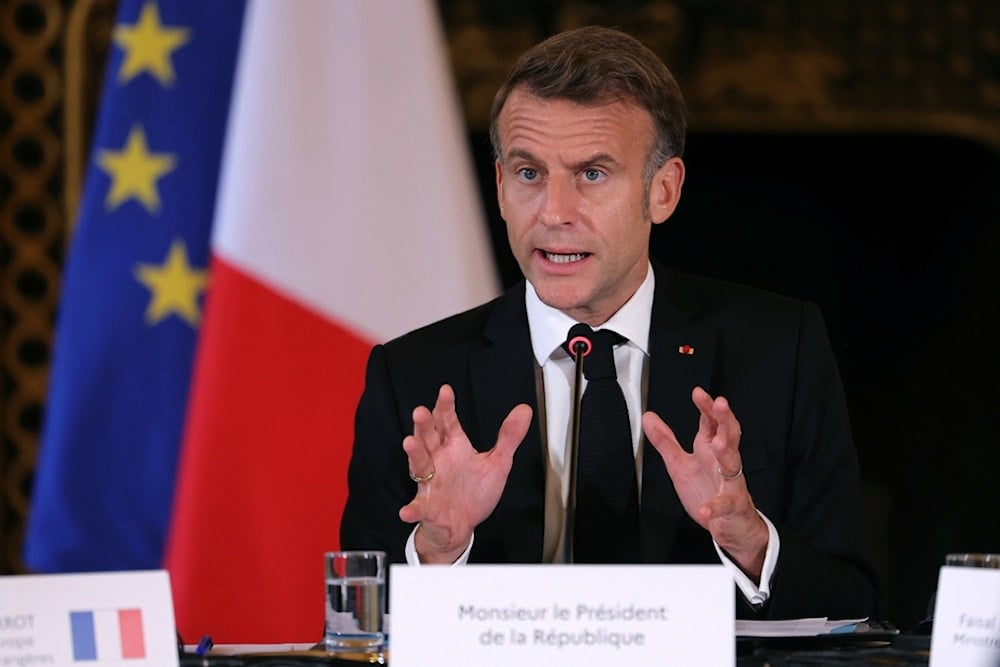Macron faces mounting turmoil as Lecornu unveils new cabinet
French PM Lecornu unveiled his second cabinet lineup as Macron faces mounting pressure after seven prime ministers.
-

France's President Emmanuel Macron speaks during a meeting with European and Arab foreign ministers at the foreign ministry in Paris, France, Thursday, Oct. 9, 2025. (Thomas Samson, Pool Photo via AP)
French President Emmanuel Macron unveiled a new cabinet on Sunday in a high-stakes bid to end months of political paralysis and push through an austerity budget before the end of the year.
Prime Minister Sébastien Lecornu, reinstated just days after his first cabinet collapsed within hours of being announced, presented a reshuffled team combining veteran figures and several newcomers. The move followed days of tense negotiations aimed at preventing France's deepening political rift from descending into full crisis.
"A mission-driven government has been appointed to provide France with a budget before the end of the year," Lecornu wrote on X, outlining his government's immediate goal of securing parliamentary approval for the 2026 draft budget.
The government faces a tight deadline to submit the proposal by Tuesday, allowing lawmakers the constitutionally required 70 days to debate it before year's end. But Lecornu's cabinet will have to navigate a fractured National Assembly that has already brought down two of his predecessors over contested spending cuts.
A record of political turnover
Macron's presidency has been marked by an unprecedented turnover of prime ministers. Since taking office in 2017, he has appointed seven, five of them in the past three years. Successive governments have struggled to govern without a clear parliamentary majority since snap elections last year left France with a hung parliament.
Sébastien Lecornu replaced François Bayrou, who was ousted in September after losing a no-confidence vote over a contentious austerity package. Before Bayrou, Michel Barnier served briefly as premier following the 2024 elections, but his government also failed to unite a divided parliament. Earlier, Élisabeth Borne resigned amid backlash to the pension reform that raised the retirement age from 62 to 64, while Gabriel Attal's short tenure ended after the collapse of his coalition in mid-2024.
Lecornu, a former defense minister known for his disciplined and combative style, has described himself as a "warrior monk." His appointment is seen as an attempt by Macron to restore authority and discipline to a government that has been repeatedly weakened by internal dissent and opposition pressure.
A cabinet of continuity and caution
The new cabinet retains several key figures to ensure continuity. Jean-Noël Barrot stays on as foreign minister, while former labor minister Catherine Vautrin takes charge of defense. Roland Lescure, a close Macron ally, continues to lead the Economy Ministry and will be tasked with the politically perilous job of securing passage of the new budget.
Other changes include the appointment of Paris police chief Laurent Nunez as interior minister after the conservative Republicans declined to join the government. Monique Barbut, formerly with the World Wide Fund for Nature, takes over the Environment Ministry. Justice Minister Gérald Darmanin remains in place, as does Culture Minister Rachida Dati, who faces trial next year on corruption charges.
Lecornu has stressed that his government should be composed of non-partisan technocrats without presidential ambitions, reflecting Macron's desire to avoid political jockeying ahead of the 2027 election.
Mounting challenges
The challenges facing the new prime minister are immense. France's deficit stands at around 5.4% of GDP, well above European Union limits, and financial markets are watching closely as the government attempts to rein in spending. Opposition parties on both the left and right have already vowed to bring down Lecornu's government if it presses ahead with austerity measures.
The Socialist Party has threatened to support a censure motion unless Macron reverses the pension reform, while the right-wing Republicans have stated they will only cooperate "bill by bill." The far-right National Rally, now the largest single party in parliament, has promised to oppose any Lecornu-led government outright.
Adding to the pressure, Macron is expected to travel to Egypt on Monday to support a US-brokered ceasefire in Gaza, a move that risks delaying the presentation of the budget. The president's absence at such a critical moment has drawn criticism from opponents, who accuse him of neglecting France's worsening domestic situation.
Read more: French MPs on hunger strike after their detainment in 'Israel'
With a weakened majority, a looming budget deadline, and widespread discontent across the political spectrum, Lecornu's government begins its mandate already on the defensive. Its survival will depend on whether it can navigate France's most turbulent political landscape in decades, and deliver a budget before time runs out.

 5 Min Read
5 Min Read








